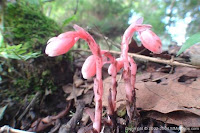
Photo by galasdeguatemala.com, used with authorization.
Continuing with some of the family outings from Guatemala City, today we start heading West, through the Pan American highway and for a while, according to my travel itinerary, we are not going back to Guatemala City. On this route, the first place we are going to visit, is the ecological park Senderos de Alux (Alux Hill Trails), a 66 acre reserve of highland pine-oak forests in the Department of Sacatepequez. The park contains natural interpretive trails, a very nice playground area, restaurant, and even a camping area.
On this route, the first place we are going to visit, is the ecological park Senderos de Alux (Alux Hill Trails), a 66 acre reserve of highland pine-oak forests in the Department of Sacatepequez. The park contains natural interpretive trails, a very nice playground area, restaurant, and even a camping area. Probably due to its proximity, most of Guatemalans associate this area with the Municipality of Mixco, which is part of the Department of Guatemala. Geography aside, the reason why I decided to stop at this place is not just because it has become a popular outing from Guatemala City, but also because it is part of the Alux Mountain Range, another and larger (5,000 hectares) protected reserve.
 The Senderos de Alux Ecological Park is co-managed by the Municipality of San Lucas Sacatepequez and ARCAS, a non-profit organization, which since its inception believes that environmental education is one of the keys to addressing the causes of wildlife trafficking and other threats to Guatemala's natural resources.
The Senderos de Alux Ecological Park is co-managed by the Municipality of San Lucas Sacatepequez and ARCAS, a non-profit organization, which since its inception believes that environmental education is one of the keys to addressing the causes of wildlife trafficking and other threats to Guatemala's natural resources.The work this organization is doing in the park is quite remarkable. They have built interpretive trails, exhibitions, amphitheaters, temporary enclosures for rescued wildlife, and a small natural history museum, and as of today, the records indicate that they reach around 10,000 children per year through educational presentations on topics related to endangered species, environment and health, litter, migratory birds, and sea turtles.
As you may appreciate by the last two pictures above (from the ARCAS Website), ARCAS is rescuing wild life from traffickers and taking care of the animals until they are ready to go back to their habitat. We can and should help preserve nature and its creatures by not endorsing merchants that sell endangered species of any kind.
In the same way, and since from now on we are going to places where people are literally struggling to preserve their traditions, their culture, their ancient legacy, and their nature, my suggestion is to continue our journey with our minds and hearts wide open, enjoying and learning from what we are about to see, and respecting what we will encounter on our way. After all, we are only visitors. Thank you for sharing my concern.


No comments:
Post a Comment
Thanks for your comments. I appreciate your feedback!